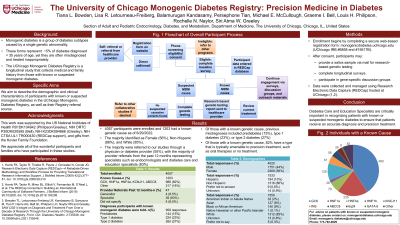Back


Diabetes in Practice
(P321) The University of Chicago Monogenic Diabetes Registry: Precision Medicine in Diabetes
Friday, August 12, 2022
12:00 PM – 1:00 PM ET

Has Audio

Tiana L. Bowden, BA
Clinical Research Coordinator II
The University of Chicago
Homewood, Illinois, United States
Primary Presenter(s)
Key Takeaways of Your Research: Monogenic diabetes is a category of diabetes mellitus. The main sub-categories are neonatal diabetes and maturity-onset diabetes of the young (MODY). The University of Chicago Monogenic Diabetes Registry, established in 2008, offers insight into the diagnosis, treatment, and natural history of individuals with known or suspected monogenic diabetes. The Registry shows that diabetes type is often misclassified for many years before genetic diagnosis. It also demonstrates the importance of provider referrals, particularly from specialized providers. These opportunities for precision diabetes medicine could be optimized by leveraging diabetes care and education specialists in identifying suspected monogenic diabetes and by increasing provider knowledge to improve clinical care and patient outcomes in monogenic diabetes.
Background/Purpose: Monogenic diabetes is a group of diabetes subtypes caused by a single genetic abnormality. These forms represent about 5% of diabetes diagnosed under 35 years of age, yet they are often misdiagnosed and treated inappropriately. The University of Chicago Monogenic Diabetes Registry is a longitudinal study that collects medical and family history from those with known or suspected monogenic diabetes. Research Hypothesis and/or Research Questions and Specific
Aims: We aim to describe the demographic and clinical characteristics of participants with known or suspected monogenic diabetes in the University of Chicago Monogenic Diabetes Registry, as well as their Registry referral source. Methods/Methodology: Study enrollment begins by completing a secure web-based registration form found on our website (https://monogenicdiabetes.uchicago.edu, UChicago IRB #6858 and #15617B). After consenting, participants may: provide a saliva sample via mail for research-based genetic testing, complete longitudinal surveys, and/or participate in gene-specific discussion groups. Data were collected and managed using Research Electronic Data Capture (REDCap).
Results: As of 6/29/2022, 4057 participants were enrolled. Of those,1203 had a known genetic cause. The majority identified as Female (56%), Non-Hispanic (86%), and White (85%). The majority were referred to our studies through a physician or diabetes provider (55%), with the majority of provider referrals from the past 12 months representing specialists such as endocrinologists and diabetes care and education specialists (83%) rather than general care providers. Of those with a known genetic cause, previous misdiagnoses included prediabetes (15%), type 1 diabetes (23%), or type 2 diabetes (27%); 82% have a type of monogenic diabetes that is typically amenable to precision treatment, such as oral therapies or no treatment. Conclusions (Impact on Diabetes Care and Education): Diabetes Care and Education Specialists are critically important in recognizing patients with known or suspected monogenic diabetes to ensure that patients receive an accurate diagnosis and precision treatment. Source of Funding for this Research: This work was supported by the US National Institutes of Health R01DK104942 (Philipson/Greeley), NIH DRTC P30DK020595 (Bell), NIH K23DK094866 (Greeley), NIH CTSA UL1 TR000430 (REDCap support), and gifts from the Kovler Family Foundation. Authors: family: Tiana Bowden, BA, The University of Chicago, Chicago, IL, Lisa R. Letourneau-Freiberg, MPH, RD, LDN, The University of Chicago, Chicago, IL, Balamurugan Kandasamy, PhD, The University of Chicago, Chicago, IL, Persephone Tian, BA, The University of Chicago, Chicago, IL, Michael E. McCullough, MPH, The University of Chicago, Chicago, IL, Graeme I. Bell, PhD, The University of Chicago, Chicago, IL, Louis H. Philipson, MD, PhD, The University of Chicago, Chicago, IL, Rochelle N. Naylor, MD, The University of Chicago, Chicago, IL, Siri Atma W. Greeley, MD, PhD The University of Chicago, Chicago, IL.
Background/Purpose: Monogenic diabetes is a group of diabetes subtypes caused by a single genetic abnormality. These forms represent about 5% of diabetes diagnosed under 35 years of age, yet they are often misdiagnosed and treated inappropriately. The University of Chicago Monogenic Diabetes Registry is a longitudinal study that collects medical and family history from those with known or suspected monogenic diabetes. Research Hypothesis and/or Research Questions and Specific
Aims: We aim to describe the demographic and clinical characteristics of participants with known or suspected monogenic diabetes in the University of Chicago Monogenic Diabetes Registry, as well as their Registry referral source. Methods/Methodology: Study enrollment begins by completing a secure web-based registration form found on our website (https://monogenicdiabetes.uchicago.edu, UChicago IRB #6858 and #15617B). After consenting, participants may: provide a saliva sample via mail for research-based genetic testing, complete longitudinal surveys, and/or participate in gene-specific discussion groups. Data were collected and managed using Research Electronic Data Capture (REDCap).
Results: As of 6/29/2022, 4057 participants were enrolled. Of those,1203 had a known genetic cause. The majority identified as Female (56%), Non-Hispanic (86%), and White (85%). The majority were referred to our studies through a physician or diabetes provider (55%), with the majority of provider referrals from the past 12 months representing specialists such as endocrinologists and diabetes care and education specialists (83%) rather than general care providers. Of those with a known genetic cause, previous misdiagnoses included prediabetes (15%), type 1 diabetes (23%), or type 2 diabetes (27%); 82% have a type of monogenic diabetes that is typically amenable to precision treatment, such as oral therapies or no treatment. Conclusions (Impact on Diabetes Care and Education): Diabetes Care and Education Specialists are critically important in recognizing patients with known or suspected monogenic diabetes to ensure that patients receive an accurate diagnosis and precision treatment. Source of Funding for this Research: This work was supported by the US National Institutes of Health R01DK104942 (Philipson/Greeley), NIH DRTC P30DK020595 (Bell), NIH K23DK094866 (Greeley), NIH CTSA UL1 TR000430 (REDCap support), and gifts from the Kovler Family Foundation. Authors: family: Tiana Bowden, BA, The University of Chicago, Chicago, IL, Lisa R. Letourneau-Freiberg, MPH, RD, LDN, The University of Chicago, Chicago, IL, Balamurugan Kandasamy, PhD, The University of Chicago, Chicago, IL, Persephone Tian, BA, The University of Chicago, Chicago, IL, Michael E. McCullough, MPH, The University of Chicago, Chicago, IL, Graeme I. Bell, PhD, The University of Chicago, Chicago, IL, Louis H. Philipson, MD, PhD, The University of Chicago, Chicago, IL, Rochelle N. Naylor, MD, The University of Chicago, Chicago, IL, Siri Atma W. Greeley, MD, PhD The University of Chicago, Chicago, IL.
